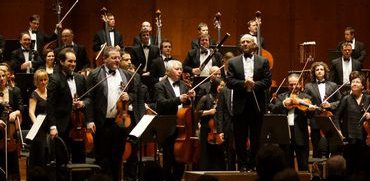Ms Montero called her musical protest "Himno Moribundo"—The Dying Anthem. Her performance does indeed resemble a funeral march, slow and grim. “Venezuela is dying!” she tells The Economist. “We’re falling deeper and deeper into a hole of nothingness. And as an artist, you can’t isolate yourself from that.” Reacting to several events in Venezuela she sees as unjust, such as Mr Maduro’s “fraudulent” victory to become president, Ms Montero has recorded various protest versions of the national anthem. Venezuela's authorities have since prevented her from re-entering the country, Ms Montero says.
Rock’n’roll artists are expected to affect a rebellious pose. For classical musicians the stakes are often a little higher. Their jobs tend to be at state-backed orchestras or subsidised symphonies, rendering them extensions of the establishment. In undemocratic or authoritarian countries, the situation is even more dicey. Yet several classical artists have memorably ruffled feathers. Consider Wilhelm Furtwängler, a leading German conductor in the early 20th century, who defended Jewish musicians in a 1933 letter to Joseph Goebbels. Or Mstislav Rostropovich, a Russian cellist, who publicly denounced the Soviet Union’s human-rights record and even sheltered Aleksandr Solzhenitsyn, a dissident writer. Yet Goebbels forced Furtwängler into submission, and the conductor’s subsequent failure to publicly protest against the Nazi regime’s crimes damaged his post-war reputation. Rostropovich was punished with a travel ban.
“Artists shouldn’t interfere with day-to-day politics, but we have a responsibility to say what we think about the underlying forces that develop society in one way or another,” argues Ivan Fischer, a Hungarian conductor. “We’re independent and have a certain visibility.” Mr Fischer, who founded and leads the respected Budapest Festival Orchestra, has taken an increasingly vocal stand against his country’s far-right tendencies, often speaking at events in support of Roma and other minorities. “Of course our situation is much less dramatic than in dictatorships, but my decision is to stay in Hungary and perform for Hungarians even though there are many things I don’t agree with,” he explains. “The popularity of the [far-right] Jobbik party is something we have to warn people about.” In his new opera, "The Red Heifer", which is based on a 19th-century blood libel case where several Jews were accused of ritually sacrificing a Hungarian girl, Mr Fischer tackles politics in a musical fashion. “There’s a long tradition of political messages in operas, going back to 'The Marriage of Figaro',” he notes. Nationalists in turn have denounced Mr Fischer as anti-Hungarian.
Not a few classical artists say that they simply want to perform music and have no duty to opine on politics. Recently Anna Netrebko, a Russian primadonna, said that artists shouldn’t “meddle in politics”. And for Valery Gergiev, a Russian conductor, good relations with the Kremlin have brought stability and, by extension, musical excellence to his Mariinsky Theatre in St Petersburg.
Vladimir Ashkenazy, a famous Russian pianist and conductor, notes that in the former Soviet Union any form of protest could cost a musician his career. "Daniel [Barenboim, an Israeli-Argentinean pianist and conductor who regularly speaks out against Israel’s occupation of Palestinian territories] can say what he wants even inside Israel because it is a democratic country. But in the Soviet Union things were very different.” And, he adds, “we must not forget that there was no possibility of international travel unless the government would allow you to do so. You were a prisoner in the country. I could play Beethoven and Chopin, sometimes even a short piece by Schönberg. I won international prizes. The government was happy with me. But of course you couldn’t say what you wanted.” The same conditions applied in Nazi Germany.
Ms Montero regrets that so many musicians opt for the we’re-only-artists argument. “If we artists are the ones who care about truth and beauty, we have to react when it’s being taken from us,” she argues. She points to her compatriot Gustavo Dudamel, a famous conductor, who has declined to speak out against Maduro or the late Hugo Chavez. “He says he wants to focus on [the music-education programme] El Sistema, but if we don’t have our country, we won’t have El Sistema,” she says.
economist.com, by E.H.B.

